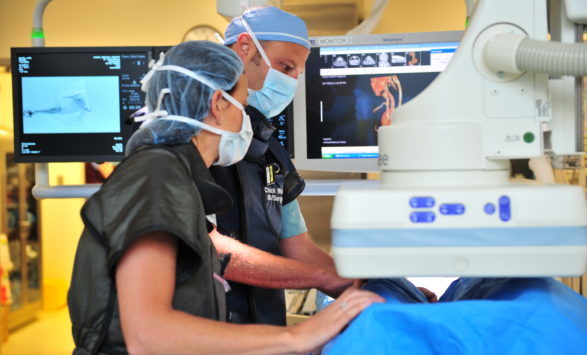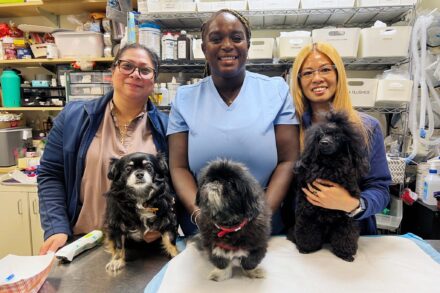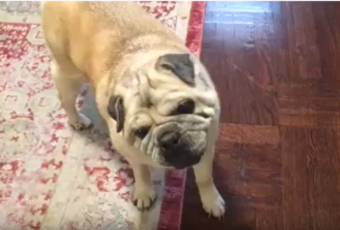Tracheal Collapse in Dogs

Background
Tracheal collapse is a respiratory disease that occurs when the dog’s trachea (windpipe) collapses, causing breathing problems and chronic coughing.
The trachea is a flexible tube made of sturdy C-shaped cartilage rings. These rings keep the trachea open, allowing air to move to and from the lungs. When these rings weaken and start to flatten, the air squeezes through a smaller space. The result is a harsh, dry cough that sounds like a goose honking.
Risk Factors
Tracheal collapse is most common in the following toy- and small-breed dogs:
- Chihuahuas
- Pomeranians
- Poodles
- Pugs
- Llhasa apsos
- Shih tzus
- Yorkshire terriers
The disease is most often diagnosed in dogs who are middle aged or older, but it is seen in young dogs as well. Dogs who are overweight or live in a household with smokers may show more severe signs.
Signs
These common signs of tracheal collapse may appear or worsen due to excitement, heat, irritants, or exercise:
- Honking cough
- Difficulty breathing
- Exercise intolerance
- Rapid breathing
- Retching
- Bluish tinge to the gums
Diagnosis
Tracheal collapse is often suspected in small- or toy-breed dogs who have the telltale honking cough. Your veterinarian may run one or more of the following tests to confirm the diagnosis and try to determine the degree of the collapse.
- Bloodwork to look at overall health.
- Chest X-rays may help with the diagnosis in some dogs and are useful for ruling out other conditions. X-rays are also useful in determining whether the collapse is located in the throat portion of the trachea or within the chest.
- Fluoroscopy, which is a movie X-ray, may be useful in making a diagnosis in dogs who have typical symptoms if there’s no obvious evidence on a regular X-ray.
- A tracheoscopy or bronchoscopy may be performed to look for evidence of a collapse. This procedure involves inserting a medical instrument with a camera on its end into the trachea.
Treatment
Obese dogs have more difficulty breathing, and being overweight can bring on the chronic cough that’s typical of tracheal collapse. If your dog is carrying extra pounds, your veterinarian may put him on a diet and exercise plan. In a small dog like a Yorkie, a half-pound of weight loss can make a big difference.
For mild to moderate cases, your veterinarian may prescribe one or more of the following medications:
- Cough suppressants
- Steroids
- Sedatives
- Bronchodilators
- Antibiotics
Medical management can be effective for up to 70% of dogs, particularly those who have mild collapse. If medical management doesn’t work, or stops working, your veterinarian may recommend surgery. This is more likely if your dog is young and the trachea is collapsed in the neck region. Traditional surgery involves making an incision in the neck and putting rings around the trachea to hold it open from the outside. Older dogs, dogs with complicating medical issues, and dogs with a lengthy portion of trachea affected are not good candidates for surgery.
If the collapse involves the entire trachea, a minimally invasive procedure may be used to place a stent inside the trachea. This woven mesh, self-expanding tube provides support to keep the trachea from collapsing.
Prevention
Dogs are usually born with this condition and it worsens over time; however, tracheal collapse can also be the result of a chronic respiratory disease. There is no known way to prevent tracheal collapse but reducing weight and exposure to irritants like smoke can help.
Exercise can help with weight management, but it may make the situation worse due to the excitement, heat and exposure to irritants. Long, slow walks are usually best. Swap out a collar for a harness to avoid putting pressure on your dog’s trachea. Less pulling generally means less coughing.
As the weather heats up and the humidity climbs, it is best to keep your dog in the air conditioning for most of the day.
Watch the Presentation
Dr. Chick Weisse, Staff Doctor & Head of Interventional Radiology at the Animal Medical Center, offers new insights into the diagnosis and treatment of tracheal collapse in pets.
Make an Appointment

Interventional Radiology & Endoscopy
AMC's Interventional Radiology and Endoscopy Service is the first facility to implement a complete interventional service for veterinary patients, pioneering the use of these lifesaving procedures in companion animals.
Learn More































